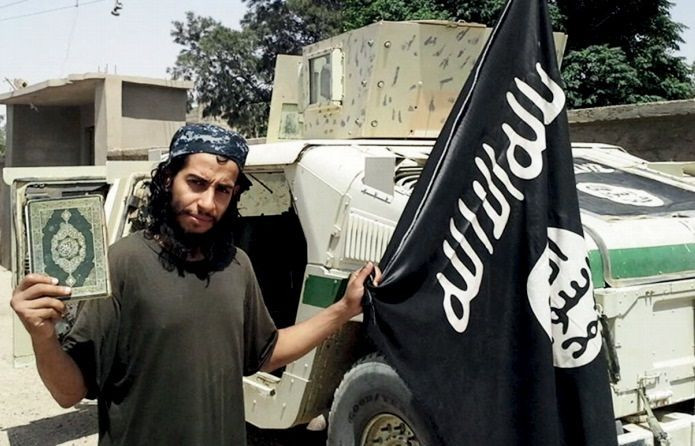ISIS vs. Daesh vs. Islamic State: American Media Struggle With Yet Another Name For Terror Group

If you caught U.S. Secretary of State John Kerry on Monday talking about the attacks in Paris, you might have heard him drop an unfamiliar word. Promising to take the fight to the terrorists who claimed responsibility, Kerry called the group “Daesh,” rather than the names everyone is used to, “ISIS” and “ISIL.”
For over a year, French journalists have taken up this alternative name for the group, and the media frenzy following Friday’s attacks raise the question of whether the U.S. press will follow suit. “Daesh” comes from an approximate acronym for the group’s Arabic name, al-Dawla al-Islamiya al-Iraq al-Sham -- but when spoken, it sounds like words meaning “one who causes trouble” or “one who crushes.”
It's considered an insult by the Islamic State group, which has threatened grisly punishment for anyone who uses it. Yet news organizations that have adopted it say terms that give "state" status to the group legitimizes it and validates its so-called caliphate. Abroad, Islamic authorities across the Middle East have rejected the group’s ideology and many refuse to call it anything “Islamic.” The U.S.' Arab allies have urged American authorities to use “Daesh” as well, the Wall Street Journal reported .
But on this side of the Atlantic, Daesh hasn't caught on.
The New York Times told International Business Times on Monday that it will stick with “Islamic State” in its coverage of the group. “We don't currently have any plans to change our style,” said Phil Corbett, the standards editor for the Times. “For one thing, I think such a change would be likely to further puzzle readers already a bit confused by Islamic State, ISIS, ISIL, etc.”
The Associated Press, which made the switch from ISIS to ISIL last year before finally settling on "the Islamic State group" -- adding "group" so as not to play into the Sunni militants' propaganda. Its style permits use of "Daesh" only in direct quotes. The AP referred IBT to this blog post on the subject when asked to elaborate.
Katy Culver, professor at University of Wisconsin-Madison’s School of Journalism and the associate director of the Center for Journalism Ethics, told IBT that it's a difficult issue to unpack.
“What’s been interesting with ISIL is the amount of apparent awareness of how their message is translating,” she said. “It’s not surprising that what they choose to be called is part of that desire for control. So of course we should be conscious of that.”
She also noted that the group has about three names already. “Are we going to confuse readers? Are we going to yet again make it unclear what group it is that we’re dealing with? I’m not sure if people already know ISIS and ISIL are the same thing.”
The Case For Daesh
Not long after the attacks on Friday that killed over 120 people in Paris, the Boston Globe recirculated a piece from late last year by Fulbright scholar and Islam expert Zeba Khan, who argued that “how we talk about this group is central to defeating them.”
“By using the militants’ preferred names, the U.S. government implicitly gives them legitimacy,” Khan wrote. “But referring to the group as Daesh doesn’t just withhold validity; it also might help the United States craft better policy.”
Apart from the government’s desire to effectively combat the group, the American media has its own concerns about picking a name. On one hand, “Islamic State” is what the group calls itself, and no one refuses to print the name of the “Irish Republican Army” or the “Lord’s Resistance Army.” On the other, no outlet wants to be accused of giving the terrorists undue legitimacy.
“To the extent that the group is claiming to be Islamic in its propaganda, news organizations have to be wary of supporting that,” Culver told IBT.
The concern over playing into the group’s hands has been on many journalists' minds ever since Fox News, in a supposed effort to confront the horror of the terrorists’ exploits, published the group’s video of a Jordanian prisoner being burned alive last year. The network took a lot of criticism for that move, because it made the terrorists’ propaganda video available to millions more people across the world than would have otherwise seen it (Fox also made the clip embeddable so any user could post it on his or her own site).
“When Fox News made available video of a prisoner being murdered, in that case it seemed clear that that was helping an agenda,” Culver said.
Question Of Islam
She also wondered why the Western press is having this conversation after the Paris attack, rather than, say, after a similarly gory suicide bombing in Beirut only days before. Islamic State claimed credit for the bombing there, too, which killed at least 42 people and maimed 239 more.
The double standard might also be due to the fact that it’s a gang of self-described Muslims under discussion, rather than a terror group declaring itself as Christian or Jewish.
“If you map this onto a different context, say a group calling itself a ‘Christian state’ or a ‘Jewish State,’ I think we’d be having a different conversation, where Christians would reject it out of hand,” Culver said. “And it would play different in a newsroom, where there would be less representation of Muslims and more Christians to push back.”
In the background is the culture battle waged by American conservatives to blame the actions of the terrorist group on the nature of Islam, calling it "a religion of violence" to justify policies ranging from immigration restrictions to war.
According to The Guardian , the label “Daesh” has spawned its own Arabic slang, "daw'aish," which is used to call people bigots.
© Copyright IBTimes 2025. All rights reserved.






















